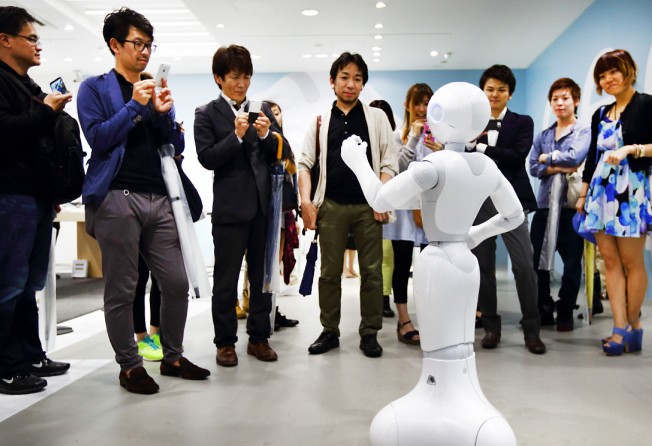Rise of the workplace robots makes humans increasingly redundant
Kevin Rafferty says estimates of devastating job losses in a range of sectors should make us sit up

A callow youth with the unprepossessing name of Eugene Goostman made a landmark achievement this month in the august surroundings of the Royal Society, the world's oldest scientific academy: he was able to convince the judges for a third of the time that he was a 13-year-old Ukrainian boy and not the chatbot he really is.
In so doing, he passed the famous Turing test, named after mathematician Alan Turing in his 1950 paper "Computing machinery and intelligence".
It is proving to be a landmark year for robots; perhaps less so for humans.
This month also, Japan's SoftBank Corporation produced what it claimed was the world's first humanoid robot that can communicate and read people's emotions. Pepper is about 120cm tall, weighs 28kg, and has censors to monitor what is going on around it to make what Masayoshi Son, SoftBank's chief executive, called "independent decisions".
Son showed how Pepper could read his emotions and realise that he was smiling. He claimed that, "100 years, 200 years or 300 years from now, people will probably recall today as a historic day in which computers changed".
Robots are potentially coming so quickly and across a broad range of jobs that large numbers of workers must fear that they may make them redundant. Economists have claimed that the recent jobless growth is a result of the intrusion of robots into human space. Only 10 years ago, scientists claimed that driving a car demanded too many complicated reactions to be susceptible to robot takeover. Yet today, Google claims that its driverless car is safer than any driven by humans.
By some estimates 140 million knowledge workers could lose their jobs to robots as technological progress advances from mechanising manual jobs to a wide range of cognitive tasks, which have hitherto remained a human domain.
Carl Frey and Michael Osborne of the University of Oxford used complex matrices to assess humans' vulnerability to machines, taking account of factors like assisting and caring for others, including persuasion and negotiation; social perceptiveness, including fine arts and originality; and manual dexterity, including finger dexterity and cramped space.
They calculate that telemarketers are the most vulnerable group, with a 0.99 probability of being replaced, as big data and smart machines advance. A probability of 1 implies certainty. Accountants and auditors (0.94), retail sales staff (0.92) and real estate agents (0.86) had better watch out, while airline pilots (0.55) and economists (0.43) look vulnerable. Only recreational therapists (0.003), dentists (0.004) and clergy (0.008) are super safe for the moment.
Bill Gates, the co-founder of Microsoft, also backed up the academics' findings. He did not use the term "bots" but preferred "software substitution", claiming, "whether it is for drivers or waiters or nurses … it's progressing … Technology over time will reduce demand for jobs, particularly at the lower end of [the] skill set."
How poor are the prospects for humans? Erik Brynjolfsson, co-author of The Second Machine Age, described himself as a "mindful optimist", and called for radical revisions of policies, especially in education and the organisation of society, to keep up with technology.
"We need to cultivate creative skills," he told Business Insider. "The word 'job' really only existed for about 300 years and it boiled down to making people almost cogs in a machine. Those kinds of routine, instruction-following jobs are being automated away." Education particularly needs change, far away from getting children to sit quietly in rows and follow instructions.
The Brits at the Royal Society were overexcited by Goostman. For five whole minutes, the chatbot managed to convince one of three judges it was "Goostman", a Ukrainian teenager with limited English skills.
His limited English and his youth are part of his natural cover story, "not too old to know everything, and not too young to know nothing", according to Vladimir Veselov, one of his creators. "Goostman" clearly has some way to go, not least because he established his credentials by computer exchanges, not face to face.
Japanese may also have a different view from Europeans and Americans, fed by science fiction that sees robots taking over the world. Minoru Asada, head of cognitive neuroscience robotics at Osaka University, said: "I see robots as a kind of partner or friend of people." In five years' time, prototypes will be available for home use, more useful than Pepper in doing chores and looking after an ageing population.
Pepper is clearly not human, but goes on sale next year at 198,000 yen, less than US$2,000.
There are still open questions about Pepper, notably the use of an internet cloud database, and the monthly rental charges for it. But Son is determined to promote the invasion of the robots. Watch out.
Kevin Rafferty is a professor at the Institute for Academic Initiatives, Osaka University